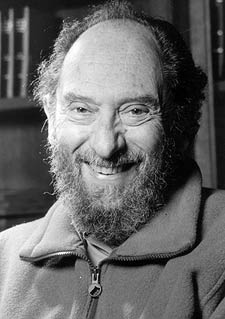Berkeleyan
Obituary
Sheldon Margen
![]()
12 January 2005
 Sheldon Margen (Jane Scherr photo) |
Margen made his mark in the field of nutritional sciences early in his Berkeley career. In 1962 he began working with Doris Calloway, a professor of nutrition, to create the “Penthouse,” one of the first research centers in the country designed to study human nutrition and metabolism. The facility was called the “Penthouse” because it was housed on the top floor of Morgan Hall.
Along with Calloway, who died in 2001, Margen directed more than 20 human-nutrition studies on a wide range of subjects, including the protein, energy, and trace-mineral requirements of healthy adults. The results of this work — which included detailed studies of food intake and energy expenditure of volunteers housed at the “Penthouse” research center — ultimately formed the basis for many of the dietary recommendations that are required on food labels today.
“There are few people in life who have had such a dramatic impact on the lives of so many others. Shelly was one of those people,” said Associate Chancellor John Cummins, a longtime friend of Margen.
Margen was considered one of the world’s foremost experts in nutritional sciences, particularly in the areas of endocrinology and biochemistry, but he was also highly regarded for his expertise in the area of bioethics and what ultimately became known in the public-health field as “wellness.”
In 1984, Margen joined publisher Rodney Friedman and Joyce Lashof, professor and dean emerita of the School of Public Health, to co-found the UC Berkeley Wellness Letter. They had the goal of producing a consumer-friendly health-promotion and disease-prevention newsletter. The Wellness Letter, which just celebrated its 20th year of publication, is now one of the most highly respected publications of its kind. The newsletter has a circulation of more than 300,000 and has generated nearly $11 million in royalties to date.
It was Margen who insisted that all proceeds from the newsletter be used to benefit directly students at the School of Public Health, including the establishment of an endowment to support students so long as the publication continues to generate revenue.
Born in Chicago on May 19, 1919, Margen moved to Southern California with his parents as a young child. He was a voracious reader with a photographic memory, and he skipped a number of grades in elementary and high school.
Margen earned his bachelor’s degree in zoology at 19 and his master’s degree in zoology and experimental embryology at 20, both from UCLA. Four years later, in 1943, he earned his M.D., graduating at the top of his medical-school class at UC San Francisco.
The following year, Margen married Jeanne Sholtz, a highly regarded pianist he had met when he was a teenager sharing the same piano teacher.
But Margen’s first two years of married life were spent apart from his wife as he served in France and Germany during and after World War II. From 1944 to 1946, he served as a doctor with the U.S. Army Medical Corps, where he rose in the ranks from lieutenant to captain.
After he returned to the United States, Margen held various clinical positions both at UC and regional medical centers and was a practicing physician in the Bay Area. From 1968 to 1974 he served as founder and president of Berkeley-based Solano Laboratories, which he turned into the first fully automated and computerized clinical laboratory in the western United States.
His first faculty position at Berkeley was as a lecturer in the School of Social Welfare, where he taught from 1956 to 1964. He also held concurrent positions as a biochemist and then lecturer at UCSF’s Department of Biochemistry between 1960 and 1970. In 1962 he was appointed associate professor in human nutrition at the Department of Nutritional Sciences, now part of the College of Natural Resources. He became a full professor in 1964 and was appointed chair of that department in 1970.
In 1979, Margen moved to the School of Public Health as professor and head of the school’s nutrition program. He is credited with revitalizing the doctoral program in public-health nutrition during his tenure as chair of that department.
Over the course of his career, Margen served on numerous committees and editorial boards. He co-chaired the Food and Nutrition Board of the National Academy of Sciences and was a consultant to the McGovern Senate Select Committee on Diet and Disease. He served as chair of the U.S. Japan Malnutrition Panel of the National Institutes of Health and as a consultant to the Agency for International Development, the World Health Organization, the Pan American Health Organization, and the government of India.
He retired from Berkeley in 1989 at the age of 70, the same year he received the Berkeley Citation. After retirement, he volunteered to chair the Peace and Conflict Studies program from 1988 to 1992, and continued to head the editorial board of the Wellness Letter until 2001. It was more than full-time work, but he refused to accept payment for any of his contributions.
In addition to his many academic accomplishments, Margen shared a passion for music with his family. He was also known as a champion of progressive causes, working throughout his life for social justice around the world.
In October 2004 the School of Public Health Library was named after Margen in recognition of his contributions to the school and to the university. Although he was ill, he attended the naming ceremony and remarked that the event was as close as he would get to attending his own memorial service. [See “Honoring a public-health legend,” www.berkeley.edu/news/berkeleyan/2004/10/08_margen.shtml.]
Margen is survived by his wife, Jeanne, of Berkeley; three sons, Claude, Peter, and David, all of Berkeley; and two grandsons. Another son, Paul, died in 2003. A public memorial service on campus is being planned for January or February 2005.
At the request of the family, donations in Margen’s memory can be made to Doctors Without Borders, Amnesty International, and Planned Parenthood.
—Sarah Yang

